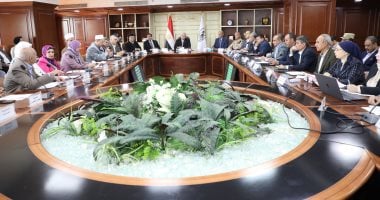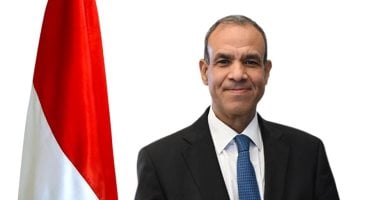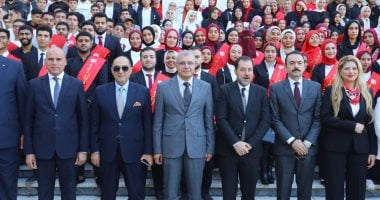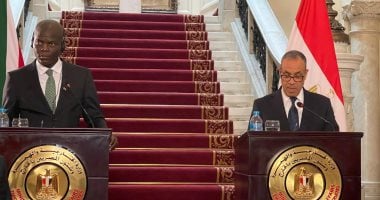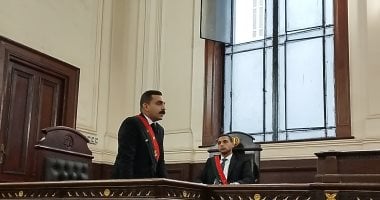معلومات الوزراء يُدشِّن العدد التاسع من مجلة "آفاق استراتيجية"
The Information and Decision Support Center of the Cabinet launched the ninth issue of the “Strategic Horizons” magazine, a periodical series prepared by a group of prominent thinkers, writers, researchers and specialists.
Dr. Osama El Gohary, Assistant to the Prime Minister and Head of the Information and Decision Support Center at the Cabinet, explained that the magazine provides insights and in-depth analyses on the most important issues raised in the regional and global arenas, whether directly or indirectly related to Egyptian affairs; thus contributing to enriching the intellectual debate on a variety of issues and topics that impose themselves on the scene.
Al-Jawhari pointed out the Information Center’s interest in issuing the “Strategic Horizons” magazine periodically, with the participation of a group of experts and thinkers from inside and outside Egypt, out of its keenness to provide decision-makers and the receiving public with valuable visions and contributions towards various issues and topics, especially those of a political nature, in light of a region that is seething with interactions and a world beset by serious challenges.
At the beginning of this issue, the Information and Decision Support Center of the Cabinet explained in its opening speech that regional tensions in the region continue at an unprecedented level, which has increased global fears of the outbreak of large-scale wars, especially after the war in the Gaza Strip entered its ninth month with the prospects of reaching a ceasefire agreement becoming more complicated and the scope of the confrontation on the Lebanese border expanding. In the midst of this highly tense atmosphere, the issuance of this new issue of the “Strategic Horizons” journal comes to shed light on this war.
The Information Center added that the issue’s theme was chosen to be “The Gaza War and the Prospects for Settlement”, in an attempt to understand the impact of this war on reorganizing the regional scene, in addition to the race for international influence in the region, and the future of American foreign policy in the region, especially since the war in Gaza is reflected in American electoral calculations, in addition to anticipating the prospects for the day after the war.
Amidst these developments and events and their repercussions on the regional and international arenas, the issue discussed a number of pivotal issues and topics through in-depth visions and analyses by a number of thinkers, experts and writers. It began with an article by Dr. Abdel Moneim Saeed, Chairman of the Board of Directors of Al-Masry Al-Youm and Chairman of the Advisory Board of the Egyptian Center for Strategic Studies, entitled “Ukraine and NATO”, in which he raised a research question: Will Ukraine be able to join the North Atlantic Treaty Organization (NATO)? Pointing out that the direct answer to this question is: “Not in the foreseeable future”! After that, all possibilities are open and depend on the outcome of the Russian-Ukrainian war, which is now in its third year, in which Ukraine has so far survived, while Russia has obtained 20% of Ukrainian territory, and at the present moment, Russia has the upper hand in military operations. The assessment is due to logical “geopolitical” and “historical” reasons, and others related to the fact that the current war was carried out to some degree or another with a hesitant reference regarding this accession, whether from within Ukraine or from within the United States, the leading country in the alliance, and thirdly, that the current Russian-Ukrainian war cannot be stopped in our time except by an equation that includes Ukraine not joining the alliance, in addition to other strategic elements that compensate Ukraine by joining the European Union.
The issue also included an article by Dr. Muhammad Al-Saeed Idris, entitled “NATO’s Challenges in Confronting Russian Ambitions,” in which he pointed out that NATO has become unable to keep up with the repercussions of the conflict with Russia, especially in Ukraine. The features of the Atlantic deficit are twofold, represented by the failure of the alliance’s foreign ministers to secure the necessary funding sources to enable Ukraine to defeat Russia, in addition to the failure or explicit hesitation to accept Ukraine’s membership in the alliance. He pointed out that NATO has become threatened by the increase in “American isolationism,” in addition to Europe’s inability to “adapt” to the requirements of playing a fundamental role in bearing the burdens of the alliance’s leadership and its financial costs, adding that Europe is still far from the responsibility of bearing its share of NATO’s defensive tasks, at a time when American capabilities are no longer sufficient to bear the responsibility alone.
In addition, the visions and analyses of thinkers and experts discussed various topics and issues, namely “NATO’s Rising Role: Between Acceptance and Rejection in East Asia”, “Iranian Elections: Will They Lead to a Shift in Foreign Policy?”, “Motives and Outcomes of the Egyptian-Turkish Rapprochement”, “Niger’s Dilemma: Assessing the Decline of US Influence in West Africa”, “Geopolitical and Strategic Dimensions of the Moroccan Atlantic Initiative for the Sahel and Sahara Countries”, and finally “Parliaments and Science Diplomacy: Building Bridges of Cooperation between Science and Parliament”.
The issue presented a special file entitled “The Gaza War and the Prospects of Settlement”; This is in order to discuss and analyze the developments in the situation in light of this war and its repercussions on the regional and international levels. The file touched on a number of topics and issues closely related to this war, which the entire world is following closely, including an analysis by Dr. Ahmed Youssef Ahmed, Professor of Political Science at Cairo University, on “The Gaza War and the Reorganization of the Regional Scene,” in which he concluded that the current Gaza War has led to relative changes in the weights of the active powers in the region, but it has not yet caused a change in the models of interactions of Arab countries with their regional surroundings. However, we must not forget that the war is still open-ended, and it will either end in a scenario similar to the end of the Israeli aggression on Lebanon in 2006, i.e. a balanced settlement, which could pave the way for a more stable Middle East with a balanced settlement, even if relatively, of the Arab-Israeli conflict, which will certainly take a long time. As for the second possible scenario, it is that the current confrontation will end – God forbid – with a military victory for Israel, which will enable it, with the support of its allies, to impose more distorted arrangements in the region, which will enhance the continuation of the protracted conflict there and its certain negative repercussions on regional stability. Likewise, the Iranian rise that has led to the current confrontation and the leadership of forces with an Islamic reference in this confrontation must receive serious scientific attention to anticipate the future of the region from the perspective of these two developments.
In the context of the issue’s file, Ambassador Rakha Ahmed Hassan, former Assistant Minister of Foreign Affairs, explained in an article entitled “The War on Gaza and the Competition of International Powers in the Region” that the Israeli war on the Gaza Strip has led to several important matters, most notably returning the Palestinian cause to the forefront of the global political and media scene after a significant decline, revealing the truth about American and Western positions on human rights, freedom and democracy, and that they are merely slogans that fall when they clash with their strategic interests, and that the international system is largely controlled by the five permanent members of the UN Security Council, and that Israel is an American protectorate, supported militarily, economically and politically, and that as long as Israel is safe from sanctions for the crimes it commits, it will not be deterred or back down from its aggressive policy against the Palestinians and the countries of the region.
The Israeli war on the Gaza Strip also made it clear that the presence and competition of international powers in the Middle East is largely linked to what the Arab countries themselves and neighboring countries in the region want, the extent of coordination between them, and the closing of the large gaps through which foreign influence and control enter. Competition between international powers will continue to obtain more interests and centers of influence, considering that the Middle East is one of the most strategically important regions in the world, in terms of location, resources, and human capabilities. The United States of America will work to increase its presence and strengthen its centers of influence in the region in the face of growing Russian and Chinese influence.
In this regard, Ambassador Mohamed Tawfik, the former Egyptian ambassador to Washington, pointed out in his article entitled “The War in Gaza and the Future of American Policy in the Middle East,” that the Israeli and Western military escalation on more than one front did not enhance Israel’s ability to deter as much as it demonstrated the extent of its dependence on indirect and direct American and Western support. He added that in light of the ongoing massacres against defenseless Palestinians, and the rejection by Israeli politicians of a political settlement based on a two-state solution, it was not surprising that American efforts to build a new regional security system that would unite Israel and a number of Arab countries in confronting Iran would falter. He pointed out that in the Middle East, Iran remains the only country capable of threatening American and Israeli interests, and containing it will be a primary goal, especially after the significant progress made by its nuclear program.
For his part, in an article entitled “Forming the New Palestinian National Authority and the Prospects for the Day After the War in Gaza,” Ambassador Dr. Ezzat Saad, Director of the Egyptian Council for Foreign Affairs, pointed out that most of the “day after” scenarios remain in the preparation phase and have not been discussed in depth, including basic issues such as: Hamas not playing any role in Gaza after the war, as demanded by the Israelis and their American allies, and defining Gaza’s relationship with the Palestinian Authority in the West Bank. In this context, some estimates indicate that the most important day after the war is not the “day after,” but rather the “decisive day,” when there is a need for humanitarian support and civil services to flow beyond mere emergency humanitarian aid, even as the Israeli military operations continue. Such support requires Israeli political will to plan and determine Palestinian priorities, in addition to international expertise and funding.
The issue’s file also discussed pivotal topics and issues related to the Gaza War and the prospects for a settlement; namely, “Iranian foreign policy in light of the Gaza War”, “The War on Gaza and the Globalization of Student Sentiments”, as well as “Britain and Israel… A Continuous History of Support”, “The Dilemma of Jurisdiction: To What Extent Will the International Court of Justice’s Decision in the Nicaragua v. Germany Case Affect the Gaza War?”, “The Implications of the Gaza War for American Electoral Calculations”, and finally “A Fragile Alternative: Will the United States Use the New Seaport to Control the Gaza Strip?”
The new issue also reviewed a group of follow-ups on the most prominent developments on the regional and international arenas by senior experts and specialists in political fields, which addressed the Sudanese scene between the opportunities for peace and the continuation of war, the future of stability in Iraq in light of the Baghdad-Erbil negotiations, and the “Aspidis Alliance”… the future of the European alliance’s mission in the Middle East, as well as an article entitled “ISIS Khorasan and targeting Moscow”, “Reading in the book” The current international system.. What guarantees for international security? “, and “The geostrategic conflict over East African ports (case study: Tanzania port agreement with Dubai.. a future reading).
The issue’s follow-ups also included discussions and analysis of other topics, such as “Banning digital platforms between effectiveness and freedom of use,” “Rwanda’s law… Will it succeed in reducing immigration flows to the United Kingdom?”, as well as “Guinea-Bissau President’s visit to Israel… Causes and repercussions,” “Telegram… Between data privacy and the risks of extremism,” and finally “Demarcating the borders between Armenia and Azerbaijan… Motives and challenges.”
The issue also included several research presentations by a diverse group of researchers, most notably under the titles “The Coming Conflict with Hezbollah,” “Between Reform and Solution: Options Available to UNRWA,” “Itamar Ben-Gvir: From Settler to Israeli Minister of National Security,” “China and the United States: Has the New Cold War Begun?” and finally “The Future of the African Growth and Opportunity Act.”
The issue concluded with an article titled “The Gaza War and More Human Contradictions” by Dr. Khadija Arafa, Head of the Community Outreach Axis at the Information and Decision Support Center, in which she explained that although the Gaza war was not revealing as much as it was confirming the amount of contradictions and selective employment of human values by Western countries, it was unique in its unprecedented number of violations of human principles, leaving behind an unprecedented humanitarian crisis, which represents a strong shock to many established Western values, and calls for an international pause in the face of this contradiction, and the necessity of intellectual review and exposing the falsity of Western claims regarding many democratic and human values that the West has always used in contradictory and selective ways and in a manner that serves its own interests.
It is worth noting that this issue contains 35 articles, analyses and presentations by a group of the most prominent thinkers, writers, experts and researchers specializing in political affairs from inside and outside Egypt, in addition to a group of experts and researchers from the Information Center.
للمزيد : تابعنا هنا ، وللتواصل الاجتماعي تابعنا علي فيسبوك وتويتر .

